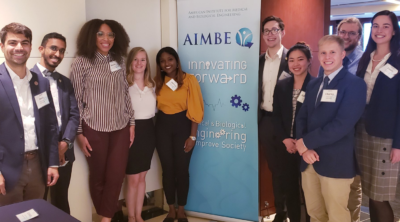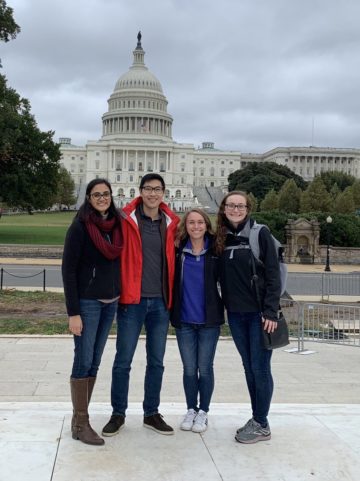AIMBE Public Policy Institute bridges science with policy

PhD students and alumni met at the Public Policy Institute for Rising Leaders in Washington DC
In October, PhD students traveled to Washington, D.C. to attend the American Institute for Medical and Biological Engineering (AIMBE) Public Policy Institute for Rising Leaders. Careers Beyond Academia Create Your Own Activity provided guidance, outreach and sponsorship for seven students to attend. Joseph Long, president of the graduate student chapter of Cornell’s Biomedical Engineering Society Society (BMES), organized the trip. “The AIMBE Public Policy Institute is a fantastic opportunity to connect with trainees and professionals in the public policy realm,” said Long. “As scientists and engineers, we do not have many chances to dip our toes in the field of public policy. This conference provides an avenue where biomedical researchers can learn more about what it takes to work with and for government agencies.”
About AIMBE
AIMBE is the American Institute for Medical and Biological Engineering, a non-profit headquartered in Washington, D.C..
~~~~~~~~~~~~~~~~~~~~~~~~~~~~~~~
 Graduate students Carolyn Chlebeck, Patrick Muljadi, Monideepa Chatterjee, and Regan Stephenson joined forces to attend the AIMBE Public Policy Institute in Washington DC on October 29-30, 2018. Cornell ‘s Careers Beyond Academia Create Your Own Activity supported their shared interest to connect their work to the funding sources that enable it, as well as the research’s impact to greater science policy, the community, and the changing research landscape. Through meetings with invited speakers of varying backgrounds, they gained an understanding of potential career paths in government, industry, and NGOs.
Graduate students Carolyn Chlebeck, Patrick Muljadi, Monideepa Chatterjee, and Regan Stephenson joined forces to attend the AIMBE Public Policy Institute in Washington DC on October 29-30, 2018. Cornell ‘s Careers Beyond Academia Create Your Own Activity supported their shared interest to connect their work to the funding sources that enable it, as well as the research’s impact to greater science policy, the community, and the changing research landscape. Through meetings with invited speakers of varying backgrounds, they gained an understanding of potential career paths in government, industry, and NGOs.
See what they learned and feedback about their experience:
“The AIMBE Public Policy Institute provided insight into policy careers in a variety of governmental functions. Speakers ranged from lobbyists to intellectual property experts to scientists from the FDA and NIH. This allowed me to develop a better sense of what an employee with higher education degree could achieve in each of these positions. Opportunities to network with these speakers also expanded my understanding of each organizations’ functions, goals, and corporate culture. This experience helped me to narrow down my career interests as well as opened my eyes to opportunities I did not know were available.”-C. Chlebek
“The AIMBE Public Policy Institute exposed us to policy experts and leaders who play a significant role in shaping medical and biological engineering. Speakers included FDA and NIH directors, governmental affairs representatives in industry, and advocacy leaders. We learned about how policies at the NIH and FDA are used to impact culture and environment in research labs and medical device companies. We also discussed the status of recent policy changes like the 21st Century Cures Act on various organizations. Overall, this experience broadened my knowledge of how policy shapes my field and future career and the various policy oriented positions and roles available to PhD graduates in biomedical engineering.”-P. Muljadi
“The AIMBE Public Policy Institute provided great insight into a number of different policy perspectives, such as the FDA, NIH, trade associations, industry, and nonprofits. As a PhD student, it was refreshing to learn about these perspectives and how they apply to my research and career. In particular, I found the session about the NIH very informative, as the speaker spoke about the grant funding cycles and how policy shapes what grants are funded. I also really enjoyed the industry speakers who spoke on the role of government affairs in medical device companies and how they advocate to policy makers the importance of R&D and patients’ insurance. Additionally, this was a very unique setting to meet other biomedical engineering PhD students from universities across the country and allowed for networking opportunities with students with similar career goals.” M. Chatterjee
“This program provides a look at how people with PhDs in biomedical and biological engineering and the biosciences can apply their training in a science policy job post-graduation. The two-day workshop described the breadth of jobs available in science policy in Washington DC as well as the steps it takes to be offered those jobs.From this event, I learned that there are many non-academic jobs in regulation and policy development for people with my expertise. It was nice to hear the successes of other students in my field getting into the seemingly exclusive sector of public policy. I think that the participation of scientists and engineers in government is becoming increasingly more important, and this Institute made that even more clear.
I recommend this workshop to PhD students in Biomedical Engineering and the biosciences that are interested in non-academic positions. Whether or not they think they have interest in this field, it is helpful to attend even if only for informational purposes” R. Stephenson
~~~~~~~~~~~~~~~~~~~~~~~~~~~~~~~
Graduate students Benjamin Albert, Jason Chang and Matthew Whitman (Biomedical Engineering) attended the AIMBE Public Policy Institute in Washington DC on October 30-31, 2017. Cornell ‘s Careers Beyond Academia Create Your Own Activity subsidized their registration and travel costs, and ASAP (Advancing Science And Policy) facilitated contacts for them to get a tour of NPR, to round up an enriching and learning experience. We share their comments and feedback below:
“The AIMBE Public Policy Institute had a strong focus on current policies in governmental agencies relating to the current state of the medical field. Speakers represented fields ranging from non-profit organizations, to government agencies, to industry. It was very enlightening to hear the different perspectives that the people with such varied backgrounds bring to the field of public policy. Some of the most important things I was able to glean from the institute was how interconnected governmental agencies are when it comes to funding for scientific pursuits. I was also able to learn many new things about certain agencies that I hadn’t given much thought to in the past. One such agency is the National Institute of Standards and Technology (NIST). Learning about NIST’s pursuits opened my eyes to the possibility of considering a career path that would involve the pursuit for more reproducible and standardized practices in scientific research.
Overall, I think that the institute was very good for introducing topics in scientific public policy and how companies and governmental agencies interact and influence these policies. I would recommend this conference for students who are interested in gaining a broad understanding of the development of public policy in science and who are interested in hearing specific perspectives from within a variety of organizations.”–Benjamin Albert
“The AIMBE Public Policy Institute for Rising Leaders featured speakers from various federal regulatory agencies, including the Food and Drug Administration (FDA) and the National Institute of Health (NIH), non-profit organizations, and the medical device industry. Over the two days of the conference, the event emphasized the integral role of evidence-based policy in shaping biomedical innovation and initiatives. Given the current political atmosphere and increasing need for biomedical research, we learned about the existing regulatory science framework and how policy developed by numerous stakeholders drives public health legislation and research funding.
As a first-year PhD student in Biomedical Engineering, I am grateful to have had this opportunity at such an early stage in my training. For example, I listened to Dr. Susan Wood, Director of the Jacobs Institute of Women’s Health Services at The George Washington University and previous Assistant Commissioner for Women’s Health at the FDA, describe the political barriers within Capitol Hill that continue to work against the fight for women’s health. I then listened to Sue Nelson, Vice President for Federal Advocacy at the American Heart Association, overview the recent progress of major healthcare legislation, particularly the Affordable Care Act (ACA), and discuss upcoming challenges in the 115th Congress facing patient-centered care. These talks greatly broadened my understanding of science policy, which, prior to this event, was limited to legislative affairs.More importantly, I was reminded of big picture policy issues beyond the need to translate my research into clinical outcomes – without rigorous science and strong science policy supporting our research, the long-term impact of our findings on society can be hindered.
Outside of the conference, I also had the opportunity to take a private tour of National Public Radio (NPR) through connections made through the Advancing Science And Policy (ASAP) group at Cornell! Thank you again to the BEST program for providing the support for me to experience this opportunity. I look forward to learning more about science policy and hope to bring what I learned from the AIMBE Public Policy Institute for Rising Leaders to better engage the Cornell scientific community.”–Jason Chang
“At the Public Policy Institute, I was able to learn from and interact with professionals working in public policy, health policy, and biomedical science-related science policy from the federal government, industry, and NGOs. I learned about possible career paths from program directors at the FDA, NIH, NIST, and outside of government. I also learned about the current status of science policy in the US and important policy on the horizon and its potential impact on funding for and accessibility to science. Additionally, I networked with other students and early career professionals who are also interested in science policy. While it was not the focus of the institute, I also learned a lot about how to communicate science to a broad audience and make it accessible and interesting.”–Matt Whitman


